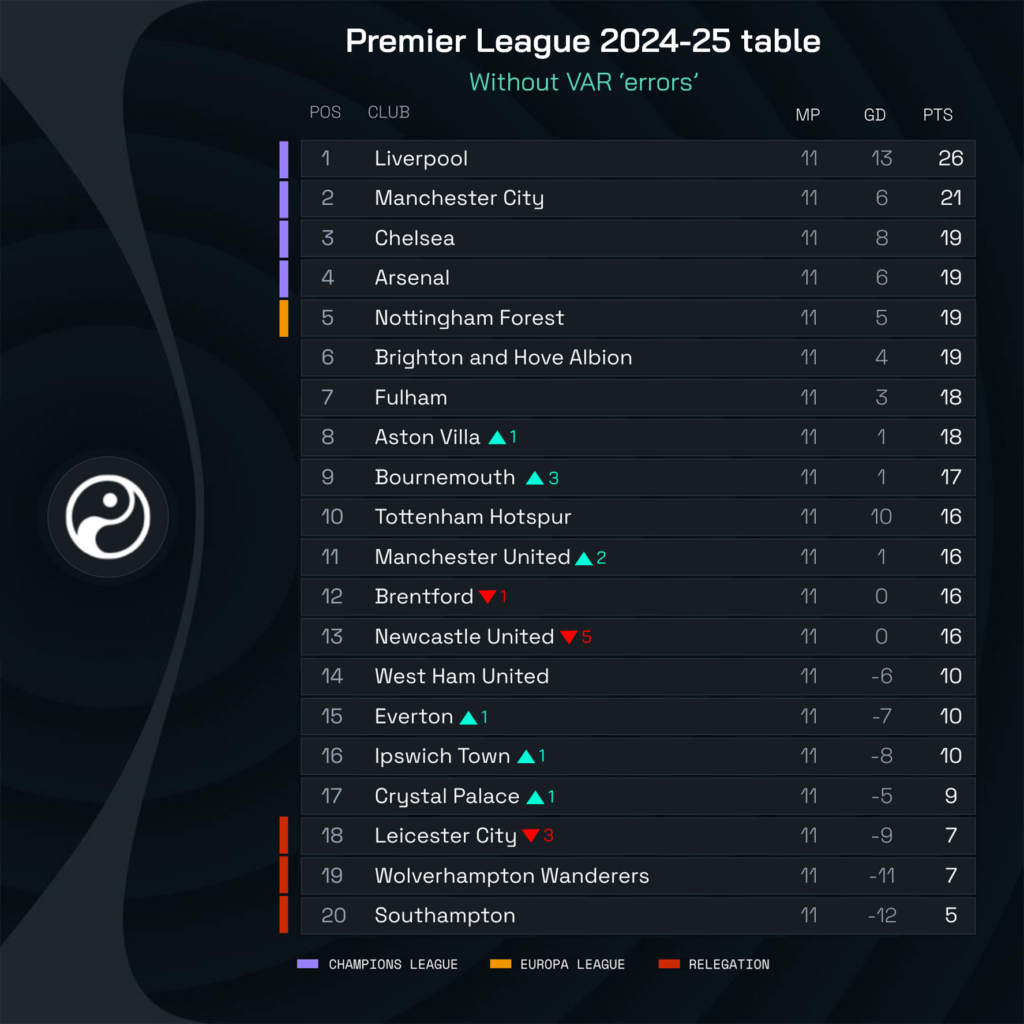Kai Havertz nearly scored the opener against his former club when he quickly capitalized on a Declan Rice free kick. However, Chelsea players protested, arguing Havertz was offside and the free kick was taken too hastily.
While the latter claim didn’t impact the call, VAR ultimately overturned the goal due to an offside position. If Havertz’s goal had been allowed, it could have helped Arsenal secure a stronger position after goals from Gabriel Martinelli and Moises Caicedo.
VAR also influenced the recent match between Tottenham Hotspur and Ipswich Town. Ange Postecoglou’s side fell 2-1, but Tottenham had a goal from Dominic Solanke overturned by VAR due to a handball. Solanke had scored shortly after halftime to bring Spurs within a single goal, which could have set the stage for Rodrigo Bentancur’s 69th-minute strike to become an equalizer rather than a mere consolation goal.
The impact of these and other VAR decisions this season offers a unique look at how the Premier League table might shift without VAR intervention. According to an analysis by Squawka, teams across the table have both gained and lost points due to VAR.

For example, Southampton would have one additional point and sit at 5 points, while Wolves would be in a similar position with 7 points instead of their current tally.
Without VAR, Leicester City would see a three-point loss, dropping further down the table. Wolves, in contrast, would have claimed a point against Manchester City after VAR confirmed John Stones’ late goal.
Crystal Palace, who has lost points from VAR rulings, would have an additional two points this season. Other teams like West Ham and Manchester United have experienced notable point changes due to VAR’s intervention on crucial penalty and offside decisions.
For Tottenham Hotspur, VAR has had a direct effect on their season, particularly in the Ipswich match. Without VAR’s intervention on Solanke’s goal, Tottenham would have claimed a crucial point, reinforcing their standing. With VAR in play, they remain in 10th position but would have risen with that extra point from the Ipswich game.
West Ham United benefited from that late penalty against Manchester United, which Jarrod Bowen converted, to pick up an extra two points thanks to VAR.
Manchester United has also been impacted, having likely lost at least a draw against Brighton due to VAR ruling out a Joshua Zirkzee goal for offside.
For Newcastle United, VAR awarded a late goal against Bournemouth, which secured a draw instead of a potential loss, proving a beneficial factor for them. Bournemouth, in contrast, would be two points higher if VAR were removed, as its rulings have altered outcomes in their favor.
Meanwhile, Chelsea sits slightly below their potential without VAR’s intervention on a Havertz goal against Arsenal. Aston Villa and Fulham are in solid positions, holding their points tally without notable VAR influence.
At the top of the table, VAR has also shaped the position of title contenders. Arsenal would have gained two points if the Havertz goal against Chelsea had stood. Manchester City would sit slightly lower without VAR’s intervention, as the system upheld John Stones’ match-winning goal.
Despite losing two points without VAR, City would still maintain the top position in the Premier League, showing their strong lead in the competition.
This breakdown illustrates the significant impact of VAR on the Premier League standings. For Tottenham and other teams, VAR decisions have led to both gains and losses, shifting how teams perform and stand relative to one another.
The evolving role of VAR continues to be a topic of debate and strategy as it shapes the season’s outcomes across all levels of the table.
Read more: Big Archie Gray exit update tonight
Read more: Postecoglou must stop rotating £100k/W Tottenham dud if he wants to save his job
Read more: Ange Postecoglou tells Spurs hierarchy which position to prioritise in January

